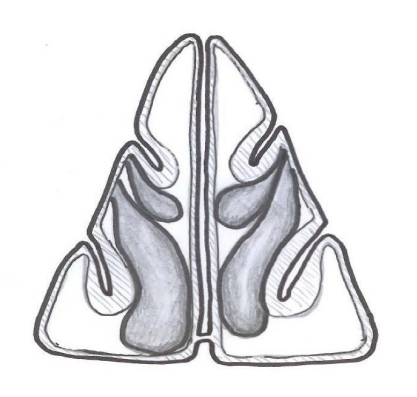Nasal Polypectomy
What are nasal polyps?
A nasal polyp is a fleshy swelling within the nose. Nasal polyps have a ‘grape-like’ appearance. They may be associated with allergy, and some patients have asthma as well. The lining of the nose becomes swollen, causing blockage.
A similar swelling of the lining of the sinuses between the eyes causes blockage of the sinuses, and then the swelling starts to bulge into the nasal cavity and then enlarges to form a polyp.

There may be several polyps which come from high up on the side wall of the nose. The nose becomes more blocked. The polyps produce mucus so the amount of nasal discharge and postnasal catarrh increases. The sense of smell takes place high in the roof of the nasal cavity, and if polyps are blocking the nose and preventing air reaching this area, the sense of smell will be poor. The normal quality of the voice changes, making it sound like you have a heavy cold all the time. There may be sinus infections because the sinuses are unable to drain properly.
Why is a nasal polypectomy done?
The aim of the operation is to remove the polyps which are blocking the nose. The operation does not ‘cure you’ of the condition, it only removes the polyp tissue which is causing the symptoms. It does not alter the underlying cause of the condition.
Surgery would only be considered if the symptoms warrant it and medical treatment with steroid sprays or drops has not helped.
Removal of the polyps should unblock the nose and reduce the nasal discharge to some degree (depending on how much of the blockage and discharge is caused by swelling of the rest of the lining of the nose). Improvement of the sense of smell after surgery is more difficult to predict. Sometimes it is improved, sometimes not.
Nasal polyps have a tendency to come back. This can be after a few months if the nose is very inflamed, or after 10-20 years if the condition is milder.
Is there any alternative treatment?
In many cases initial treatment with steroid sprays or drops will reduce the size of the polyps. It will not ‘cure’ the condition, but may shrink the polyps enough for you not to be troubled by the symptoms. If the polyps are large and numerous when first diagnosed, steroid treatment may not be enough to improve the symptoms and surgery may be needed.
How is the operation done?
The operation is usually done under a full general anaesthetic. It takes about 30 minutes in all. The operation is all done inside the nose and no swelling or bruising is expected on the face. The polyps are removed and sent for analysis, and we would normally put packs into the nose to prevent bleeding afterwards. The packs would be removed the next morning and, until then, you will have to breathe through your mouth. You should be able to eat and drink normally after an hour or two.
What are the possible complications of the operation?
The operation is done under a general anaesthetic, and all operations under a general anaesthetic carry a small risk. You would be able to discuss this with your anaesthetist. Risks include:
- Sometimes the nose can bleed after the operation. This can happen within a few hours of the operation, or after you have gone home, up to 10 days after the operation. Rarely would you need to return to theatre and have a second general anaesthetic to stop the bleeding
- Infection in your nose is rare after this type of surgery but can be serious, so you need to see a doctor if your nose is getting more blocked and painful after you have gone home
- Scarring across from the septum to the side wall of the nose can occur after nose operations – an adhesion – and this can cause some blockage, but may cause no symptoms at all
- Very rarely there can be a loss of your sense of smell and taste after the operation.
Before the operation
- Arrange for two weeks off work
- Check that you have a friend or relative who can take you home after the operation as you must not drive for at least 24 hours after a general anaesthetic
- Make sure that you have a supply of simple painkillers at home.
After the operation
We may give you some drops or a spray after the operation to use at home. Try to stay away from dusty or smoky atmospheres. Expect the nose to be blocked and wet for a couple of weeks like a head cold.
Do not blow your nose for about a week. If you are going to sneeze, sneeze with your mouth open to protect the nose. Some blood stained discharge from the nose is normal for the first week or two.
Where can I find out more about the operation?
If you have any questions about general anaesthetics, the Royal College of Anaesthetists website has a lot of information: www.rcoa.ac.uk
Useful contact numbers
Dorset County Hospital Switchboard – 01305 251150
ENT secretaries (Dorchester)
Mr Ford 01305 255138
Mr Tsirves 01305 253167
Mr De Zoysa 01305 255138
Mr Sim 01305 254205
Mr Lale 01305 255510
Mr Kenway 01305 255138
Mr Chatzimichalis 01305 255510
ENT secretaries (Yeovil)
01935 384210
About this leaflet
Author: Mr Glen Ford, ENT Consultant
Reviewed by: Mr Bruno Kenway, ENT Consultant, March 2020
Approved: August 2020
Review date: August 2023
Edition: 2
If you have feedback regarding the accuracy of the information contained in this leaflet, or if you would like a list of references used to develop this leaflet, please email patientinformation.leaflets@dchft.nhs.uk
Print leaflet